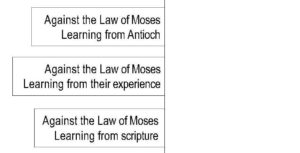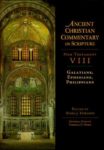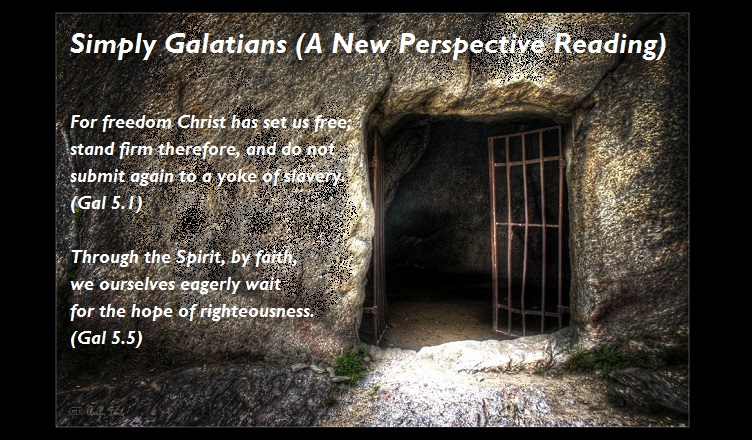From Galatians 3

The Early Perspective on Paul has equipped us to better understand what life is like under the power of the Spirit. Now that we have been saved, what empowers the process of our salvation so it may be consummated? The law of Moses and the flesh or the Holy Spirit? Today we learn that Christian life is empowered by the Spirit as Paul continues his argument against going back to Judaism and its works.
This post is part of my Simply Galatians series.
Passage and Comments
As a reminder of the context, as mentioned in my Introduction, Paul has heard the Gentile Christians were again observing various festivals and sabbaths commanded in the law of Moses and were considering circumcision.
This behaviour leads Paul to question if they have now gone after another gospel. Which is why Paul has written this letter. To stop them living according to the law of Moses and live by faith in Christ.
I have highlighted in the first post Paul and Peters common understanding of the gospel.

Paul and Peter both believed the gospel is the story of Jesus (life, death, resurrection, appearances and coming judgment) which declares him Lord and Christ. Their gospel is in accordance with the Old Testament promises and prophecies that anticipate Christ’s coming.
The Second post considers the implications of this Gospel for Gentile believers.

The chief implication relevant to Galatians is that Jesus in the gospel has introduced a new covenant for the people of God. The law of Moses was given to the Jews and part of the old covenant era. Jesus has inaugurated the new covenant, and consequently a new way to live as God’s people (Jews and Gentiles).
The righteous now live through the Spirit, by faith and love. This also means the righteous are no longer identified by their observance of the works of law, rather by faith in Christ. This includes believing Gentiles as part of the covenant family of God.
In the second post we saw Paul argue against observance of the law of Moses by describing his confrontation with Peter in Antioch where Peter gave the impression Gentiles had to observe the works of law and become Jews.

In our post today Paul gives more reasons why the Gentiles in Galatia should not observe the law of Moses.
Paul has finished describing his episode with Peter and his personal experience of Jesus death. He now describes the Galatians initial reception of the gospel and what they have seen of Jesus’ death.
Gal 3.1-9
3 O foolish Galatians! Who has bewitched you? It was before your eyes that Jesus Christ was publicly portrayed as crucified.
2 Let me ask you only this: Did you receive the Spirit by works of the law or by hearing with faith?
3 Are you so foolish? Having begun by the Spirit, are you now being perfected by the flesh? 4 Did you suffer so many things in vain—if indeed it was in vain?
5 Does he who supplies the Spirit to you and works miracles among you do so by works of the law, or by hearing with faith 6 just as Abraham “believed God, and it was counted to him as righteousness”? (Gal 3.1-6)
 ‘Before your eyes’. Paul’s gospel presentation described Christ’s death in such vivid detail that he can say they saw Jesus’ public death on the cross.
‘Before your eyes’. Paul’s gospel presentation described Christ’s death in such vivid detail that he can say they saw Jesus’ public death on the cross.
‘Did you receive the Spirit’. Paul’s gospel presentation led to a notable experience where they received the Spirit. This is evidence God accepted them and that they are Christians (Acts 11.17; Rom 8.9-11).
The word of Christ (the gospel) likewise generates faith (Rom 10.17). With Calvin I believe faith is a gift of the Spirit (Inst. 3.1.1). So in sequence: Gospel-Spirit-Faith. And Faith is the sign of the Spirit’s work (cf. Rom 4.11). (Contra. Schreiner, Galatians who thinks the Spirit is the sign of faith. This is backwards. No the experience of receiving the Spirit is what Paul refers to here, and this affirms God’s acceptance of them. Note Hays discussion regarding the interpretative options here. Hays, Faith of Jesus Christ).
God supplies the Spirit by hearing the gospel which produces heartfelt faith. The reception of the Spirit must have been a significant and memorable experience for them.
Importantly for Paul’s argument against observance of the law of Moses, they did not receive the Spirit through their former observance of the works of law. Paul uses this comparison to help them realise the works of law, for however long they observed them, did nothing for them. It was only through the gospel presentation they received the Spirit and came to faith.

‘Being perfected by’, ‘flesh’, ‘Spirit’. Christian life involves the process of salvation, in which the Spirit guides and empowers believers to continually grow and mature, persevering in repentance and obedience (See my page on Future Judgment and Salvation).
But the Galatians have returned to the ‘flesh’. The term refers to two concepts. In part to the physical act of circumcision, law of Moses and the old age and covenant. In part the weakness and sinful temptation associated with physical bodies in this age. ‘Flesh’ is associated with captivity to sin and the works of law (‘by works of law no flesh shall be justified’ cf. Gal 2.16; Rom 3.19). The Galatians have received the Spirit and come to faith, but now they have reverted to their former observance of the works of law.
Unlike circumcision which facilitates entry into the old covenant. The ‘works of law’ were more about maintenance of that covenant relationship. The fact that the god fearing Galatians had been observing some works of law without being circumcised suggests some sort of middle ground for god fearers who are considering full fledged membership.
The Galatians weren’t trying to ‘get in’ to become Jews (this requires circumcision), they were trying to ‘stay in’ as god fearers (by maintaining the ‘works of law’).
See my Introduction and here for more on ‘works of law’. (Contra. Schreiner, Galatians, who thinks by reverting back to works of law they were trying to enter the covenant).

‘Flesh’, ‘Spirit’. Paul for the first, but not the last time in this letter, associates the ‘flesh’ with the ministry of the Judaizers and the works of law which belong to the past age under the law. This is is contrast to Paul’s new covenant ministry, his gospel message and the Spirit.
Paul rebukes them for not learning all of Christian life is guided and empowered by the Spirit, not just its initial reception.
Gal 3.6-9
6 just as Abraham “believed God, and it was counted to him as righteousness”? 7 Know then that it is those of faith who are the sons of Abraham. 8 And the Scripture, foreseeing that God would justify the Gentiles by faith, preached the gospel beforehand to Abraham, saying, “In you shall all the nations be blessed.” 9 So then, those who are of faith are blessed along with Abraham, the man of faith. (Gal 3.6-9)

‘Abraham believed God’, ‘counted as righteousness’, ‘those of faith’, ‘Sons of Abraham’. Paul refers to Abraham for the first time in this letter. As he does in Romans 4, Paul groups together the concepts of faith, justification and sonship. So does Ireneaus of Lyons (c.e. 125-202) from the second century.

But that our faith was also prefigured in Abraham, and that he was the patriarch of our faith, and, as it were, the prophet of it, the apostle has very fully taught, when he says in the Epistle to the Galatians:
“He therefore that ministereth to you the Spirit, and worketh miracles among you, [doeth he it] by the works of the law, or by the hearing of faith? Even as Abraham believed God, and it was accounted unto him for righteousness. Know ye therefore, that they which are of faith, the same are the children of Abraham. But the Scripture, foreseeing that God would justify the heathen through faith, announced beforehand unto Abraham, that in him all nations should be blessed. So then they which be of faith shall be blessed with faithful Abraham.” (Gal 3.5-9)
For which [reasons the apostle] declared that this man was not only the prophet of faith, but also the father of those who from among the Gentiles believe in Jesus Christ, because his faith and ours are one and the same: for he believed in things future, as if they were already accomplished, because of the promise of God; and in like manner do we also, because of the promise of God, behold through faith that inheritance [laid up for us] in the [future] kingdom. (Irenaeus, Against Heresies 4.21.2)
Abraham is the prime example of faith apart from the law of Moses. Prior to the giving of the law. God made Abraham significant covenant promises. God promised he would give Abraham offspring as numerous as the stars. A massive worldwide family.
Abraham was counted righteous because he continued to trust in God’s promise that he would have offspring as numerous as the stars. (p282, DeSilva, Galatians). He was already in right relationship with God as demonstrated from his obedience from Gen 12 (cf. Heb 11.8). This counting of righteousness was the chief indicator that God recognised he met his covenant condition of believing in the promise. (Contra. Schreiner, Galatians, who argues from Rom 4.5 Abraham is ungodly. He is mistaken. According to Paul, Abraham believed God would bring in the ungodly, that is Gentiles into his family, not that he was ungodly himself. Also Schreiner denies that Paul sees in Gen 12.3 that God’s promise to Abraham that ‘all nations will be blessed’ refers in any way to Gentiles who believe).
Faith and righteousness also became the chief indicator of who was in Abraham’s family. Those who in effect are his sons (and daughters).
The counting of righteousness and sonship often go together in Paul’s thought.
In all this Paul tells the Galatians, because they believe in Jesus, they are Abraham’s offspring and thus beneficiaries of God’s covenant promises, which include the giving of the promised Spirit (Gal 3.14). The works of the law of Moses did nothing for them.
Gal 3.10-14
10 For all who rely on works of the law are under a curse; for it is written, “Cursed be everyone who does not abide by all things written in the Book of the Law, and do them.”
11 Now it is evident that no one is justified before God by the law, for “The righteous shall live by faith.” 12 But the law is not of faith, rather “The one who does them shall live by them.”
13 Christ redeemed us from the curse of the law by becoming a curse for us—for it is written, “Cursed is everyone who is hanged on a tree”— 14 so that in Christ Jesus the blessing of Abraham might come to the Gentiles, so that we might receive the promised Spirit through faith. (Gal 3.10-14)
‘Rely on works of law’, ‘under a curse’, ‘all things written’. This is a ballsy and shocking statement for those of the Jewish persuasion, because normally law observance is associated with blessing.
Paul warns the Gentile believers against mere observance of the works of law (discussed in the Introduction). Marius Victorinus (c.e. ~300’s) gives the common early understanding of works of law.

From his saying “works of the law” we are to understand that there are also good works in the Christian life, especially those that the apostle frequently commends, such as that we should be mindful of the poor and the other precepts for living that are contained in this very letter. The fulfillment of all these works is the calling of every Christian.
The cursed works of the law referred to here are therefore other things: obviously observations [of days,] sacrifices of lambs and other such works that they perform concerning circumcision and the choice of foods.
But now the paschal feast has been consummated through Christ. (Marius Victorinus, Epistle To The Galatians 3.10; Edwards, M.J. ed., 1999. Galatians, Ephesians, Philippians, Downers Grove, IL: InterVarsity Press)
The law of Moses requires the whole law to be kept (Dt 27.26; See my word study here), not just the works of law. Those who put themselves under the old covenant, will also come under its curse if they do not observe the whole law (cf. Gal 5.3; p287, DeSilva, Galatians).
Paul’s argument presupposes the Galatian god fearers were not keeping the whole law of Moses in their observance of the works of law. His point is that anyone who observes some of the law (the works of law), but not all of it will be under a covenant curse because the law itself curses all those who do not keep the whole law (Gal 5.3).
Reformers like Schreiner commonly and wrongly assume to be righteous one has to be sinless and perfect (Dunn, Galatians). To determine whether someone is righteous or not, reformers look for the presence of sin. The authors of scripture on the other hand look for regular practice of what is right and use the term ‘keep’ with respect to God’s commands (Lk 1.5-6; Rom 2.27; 1 Jn 3.7; Rev 14.12). The biblical understanding of keeping God’s commands includes repentance and a means of atonement for sin, which is why Paul says, ‘as to righteousness under the law, he was blameless’ (Phil 3.6). This applies for both covenants.
Its commonly overlooked by reformed interpreters (e.g. Schreiner) there were some people who did keep God’s commands and this was common knowledge in Old and New Testament times (e.g. Josh 22.1-3; 2 Sam 22.21-25; Ps 25.10; 103.18).
Schreiners attempts to maintain that keeping the law of Moses now requires sinless and perfect obedience because the levitical sacrificial system no longer atones. But this ought to be rejected as well. A Jewish mindset would never assume this and if this was Paul’s underlying rationale he would be forced to make it explicit. Paul’s rationale is based on the simpler understanding that the works of law are only partial obedience to the law, and the law of Moses itself is part of the old covenant which has now been superseded by Christ in the gospel.
(For a fair rebuttal of Schreiners traditional view see Cranford, The Possibility of Perfect Obedience: Paul and An Implied Premise in Galatians 3:10 and 5:3; also referenced by DeSilva, Galatians).
‘No one is justified before God by the law’. Despite the fact that some people did keep the whole law of Moses, Paul rules it out as the means by which the righteous are identified (justified) before God. Why?
‘Live by’. Because Paul hints at the perceived instrumental value of the law observance verses pistis (probably faithfulness, possibly faith) directed towards God for giving ‘life’. What is ‘life’ and how is it connected to justification?
Life is a state of being which is pleasing to God. It implies a positive relationship with God, living in his intended way and abundant spiritual blessing.
Those who have ‘life’ are those who are identified as righteous before God. Because the law of Moses cannot produce life and righteousness (cf. Rom 8.2-4; Gal 2.21) the law cannot justify before God. Pistis towards God on the other hand can. Paul quotes Habakkuk 2.4 which says by a person’s pistis they will live. According to Paul the righteous live by their faith towards God, not by relying on the law of Moses.
‘The law is not of faith’, ‘who does them shall live by them’. If the law was ‘of faith’ they might be okay. But it is not. Paul quotes Lev 18.5 to demonstrate the law is not of faith and we should note this passage is surrounded by references to Abraham and Jesus Christ.
Don Garlington, second generation New Perspective explains;
To say that the law is “not of faith” is to affirm that the law and faith belong to distinctly different historical realms: the former does not occupy the same turf in the salvation-historical continuum as the latter. … Virtually every commentator recognizes that Paul, in some way or the other, plays off believing and doing in v. 12. But in what sense are the two set in opposition? The majority of scholars assume that they are mutually exclusive by the nature of the case: “faith” by definition excludes “works,” and vice versa.
However, in historical perspective, any dichotomy between believing and doing in the Jewish schema is simply off base: Judaism was and is as much a “faith system” as Christianity. … “Doing the law,” according to the context of Leviticus 18:5, is not “performance” but the exercise of faith within the parameters of the covenant. Neither the OT nor later Jewish theology recognizes a distinction between doing and believing: they are the two sides of the same coin.
Therefore, the resolution of the problem must be sought along the lines of the historical character of Paul’s argument. His is not a topical discussion of faith and works, but an epochal delineation of the respective places of law and faith in salvation history. (D., Garlington, A Shorter Commentary on Galatians; see also p290, DeSilva, Galatians)
‘Christ redeemed us’, ‘by becoming a curse’. Paul says Christ redeemed them from the curse of the law. Which implies that before believing Paul’s gospel the Galatian Gentiles were captive to the law (Gal 3.23) and under its curse for not keeping the whole law. (Contra. Schreiner, Galatians, who universalises the law and assumes all are under it. He does not understand the Galatian Gentiles were god fearers and not all Gentiles were god fearers.)

From this curse Christ redeemed them by taking on another curse, his death on the cross (cf. Dt 21.23; Rom 7.4-6). The verb “redeemed” (ἐξαγοράζω; cf. Gal 4:5), along with its cognates, is central in Pauline theology. The language hearkens back to the exodus, where Yahweh freed his people from Egyptian bondage. Redemption is a slave market term, through which a price is paid to purchase a group of slaves for a new owner. Here Christ’s death is the price paid which carries the idea of freedom from captivity and entry into God’s service, rather than substitutionary atonement (Contra. Schreiner, Galatians).
What did Christ’s death on the tree accomplish?
‘So we might receive the promised Spirit’, ‘blessing’. Now having come to faith and made part of Abraham’s family (offspring) the Gentile believers have become beneficiaries of God’s promises. Christ’s death not only achieves redemption, it brings Jews and Gentiles together into the one covenant family (cf. Eph 2.11-19).
The most significant for their purposes is that they have received the Spirit. Their former experience in receiving the Spirit further highlights the works of law did nothing to contribute to their receiving the Spirit. Rather it was Christ’s death and the gospel message which produced their faith and allegiance to Christ.
Gal 3.15-18
15 To give a human example, brothers: even with a man-made covenant, no one annuls it or adds to it once it has been ratified.
16 Now the promises were made to Abraham and to his offspring. It does not say, “And to offsprings,” referring to many, but referring to one, “And to your offspring,” who is Christ.
17 This is what I mean: the law, which came 430 years afterward, does not annul a covenant previously ratified by God, so as to make the promise void. 18 For if the inheritance comes by the law, it no longer comes by promise; but God gave it to Abraham by a promise. (Gal 3.15-18)
‘Once it has been ratified’. Ratified means to sign or give formal consent to a treaty, contract, or agreement, making it officially valid. Paul looks back to the original inception of the Abrahamic covenant. He notes the covenant was ratified (when the LORD passed through the split animals Gen 15.17-18) prior to the giving of the law of Moses and the sign of circumcision.
‘Offsprings’, ‘Offspring’. Paul interprets the LORD’s promise to Abraham in a novel way by forcing a singular meaning of ‘offspring’ on the wording of the promise. He does this to highlight the promise anticipated the coming of the Christ, not the whole nation of Israel.
‘Inheritance comes by’. He draws these both together saying the promises given to Abraham were to be fulfilled in Christ and ratified prior to the giving of the law of Moses. This means the coming under the law of Moses is not necessary to become a beneficiary of the covenant promises of God.
Gal 3.19-22

19 Why then the law? It was added because of transgressions, until the offspring should come to whom the promise had been made, and it was put in place through angels by an intermediary. 20 Now an intermediary implies more than one, but God is one.
21 Is the law then contrary to the promises of God? Certainly not! For if a law had been given that could give life, then righteousness would indeed be by the law. 22 But the Scripture imprisoned everything under sin, so that the promise by faithfulness of Jesus Christ might be given to those who believe. (Gal 3.19-22)
‘Added because of transgressions’. Paul explains the law of Moses was given to Israel because of their sins (cf. 1 Tim 1.9) so that they could trespass more (Rom 5.20) and come under the LORD’s wrath (Rom 4.15). In their story we find that Israel sinned along the way to Sinai, through their wilderness wanderings and afterward. Throughout their journey the LORD gave them many rules and commands by angels (messengers from God who spoke to Moses) as a result of their sins.
‘Scripture imprisoned everything under sin’. Paul refers to the law as scripture (cf. Rom 3.10-20, Contra. Schreiner, who thinks the scripture personifies God. No, in Paul’s thought the law consists of the narrative of Israel which includes the commands recorded in scripture) because the law of Moses is encapsulated in scripture. Paul reiterates the law cannot give life and righteousness (cf. Gal 3.11-12; 2.21). It’s the law, which held its adherents (Israel) captive and under sin. Sin being a controlling power over the lives of those in its dominion.
Paul deflects the Galatians away from the law of Moses by explaining its purpose and pointing to the promises which are fulfilled in Christ.
‘Promise by faithfulness of Jesus Christ’. Paul says righteousness is through the death of Christ (Gal 2.21) and not by the law. The Greek expression pisteos Iesou Christou could be rendered promise by ‘faith in Christ’ given to those who believe which has a tautology, or the better promise by ‘the faithfulness of Christ’ (His obedience leading to his death on the cross) given to those who believe. I follow Richard Hays (Contra. Schreiner, Galatians, who fails to convince) here who says;

Jesus Christ in the role of Subject, with Tioztq as the power or quality which enables him to carry out his mandate. If this is correct, Gal 3:22 must not be interpreted to mean that believers receive the promise by the subjective act of placing their faith in Jesus Christ;
instead, it must mean that Jesus Christ, by the power of faith, has performed an act which allows believers to receive the promise. (p115, R., Hays, The Faith of Jesus Christ: The Narrative Substructure of Galatians 3:1-4:11)
Gal 3.23-25
23 Now before faith came, we were held captive under the law, imprisoned until the coming faith would be revealed. 24 So then, the law was our guardian until Christ came, in order that we might be justified by faith. 25 But now that faith has come, we are no longer under a guardian, (Gal 3.23-25)
‘Captive under the law’. Paul is speaking to Gentiles who have put themselves under the law of Moses. Paul himself was a Jew who lived under the law. Paul and the Galatians therefore have in common the fact that they were captive under the law. Effectively prisoners.
‘Before pistis came’, ‘Coming pistis revealed’, ‘pistis has come’, ‘until Christ came’. All this changed when Christ came. In this passage Paul refers to Jesus Christ event – the gospel – as ‘pistis’ (faith, faithfulness). Jesus Christ is the faithful one. The gospel describes his faithfulness. (Contra. Schreiner, who says this view ‘wrongly splits redemptive history from anthropology’. This is a great example of forcing a reading into a pre-established framework).
Paul and the Galatians were under the law and for a time it served as a guardian servant used to look over and protect its charge until the day they as sons would come of age. Paul and the Galatians have now come of age and no longer need the guardian because Christ has come.
Stendahl, one of the earliest ‘New Perspective’ proponents (see my review here) explains how many reformers have misrepresented Paul at this point. (Contra. Schreiner, Galatians, who quotes Luther’s misunderstanding in order to apply this passage).

The problem we are trying to isolate could be expressed in hermeneutical terms somewhat like this: The Reformers’ interpretation of Paul rests on an analogism when Pauline statements about Faith and Works, Law and Gospel, Jews and Gentiles are read in the framework of late medieval piety. The Law, the Torah, with its specific requirements of circumcision and food restrictions becomes a general principle of “legalism” in religious matters. Where Paul was concerned about the possibility for Gentiles to be included in the messianic community, his statements are now read as answers to the quest for assurance about man’s salvation out of a common human predicament. This shift in the frame of reference affects the interpretation at many points. …
In his extensive argument for the possibility of Gentiles becoming Christians without circumcision etc., Paul states that the Law had not come in until 430 years after the promise to Abraham, and that it was meant to have validity only up to the time of the Messiah (Gal. 3:15-22). Hence, its function was to serve as a Custodian for the Jews until that time. …
In the common [Lutheran] interpretation of Western Christianity, the matter looks very different. One could even say that Paul’s argument has been reversed into saying the opposite to his original intention. Now the Law is the Tutor unto Christ. Nobody can attain a true faith in Christ unless his self-righteousness has been crushed by the Law . The function of the Second Use of the Law is to make man see his desperate need for a Savior. In such an interpretation, we note how Paul’s distinction between Jews and Gentiles is gone. (p84f, Stendahl, Paul among Jews and Gentiles)
Gal 3.26-29
26 for in Christ Jesus you are all sons of God, through faith. 27 For as many of you as were baptized into Christ have put on Christ. 28 There is neither Jew nor Greek, there is neither slave nor free, there is no male and female, for you are all one in Christ Jesus. 29 And if you are Christ’s, then you are Abraham’s offspring, heirs according to promise. (Gal 3.26-29)
‘Sons of God’, ‘Abrahams offspring’, ‘heirs’. ‘Faith’ has replaced the law as the distinctive mark of the ‘sons of God’ (cf. Ex 4.22-23; Dt 14.1; Hos 11.1; Dunn, Galatians, McKnight, NIVAC Galatians). Hence we see here the concepts of faith, righteousness and sonship working together in Paul’s thought. Righteousness and Sonship are through faith in Christ. Sons inherit the blessings that come with the covenant.
‘Baptism’. They have become members of the covenant, Abraham’s offspring (cf. Rom 9.8) by baptism of the Spirit. (Dunn, Baptism in the Spirit, Contra. Schreiner, Galatians, Who, wrongly connecting circumcision and baptism, thinks water baptism is in mind here. Paul however associates entry into the body of Christ with the Spirit. Cf. 1 Cor 12.12-13; Eph 2.18-19).
Words for Believers

‘You are all one in Christ’. Regardless of their former worth or status they are now all one in Christ. Paul affirms the unity of the body of Christ despite the differences. But is this how things are in our churches?
 “What kinds of people are uncomfortable for us? For many churches, people who join “their” church after a long relationship with another church from a different denomination are unsettling. Sometimes this discomfort arises from a Christian practice (like the gifts of the Spirit, raising hands while singing), at other times because of doctrinal variations (like eternal security, views of the future, variant translations of the Bible), and at still other times because of suspected doctrinal deviations (like the truthfulness of Scripture or the deity of Christ).
“What kinds of people are uncomfortable for us? For many churches, people who join “their” church after a long relationship with another church from a different denomination are unsettling. Sometimes this discomfort arises from a Christian practice (like the gifts of the Spirit, raising hands while singing), at other times because of doctrinal variations (like eternal security, views of the future, variant translations of the Bible), and at still other times because of suspected doctrinal deviations (like the truthfulness of Scripture or the deity of Christ).
I maintain that while different denominations seem to flow naturally from human sinfulness and the inability of Christian leaders to be infallible in their judgments, it is fundamentally important for churches to maintain a unity of the Spirit when people of diverse viewpoints are worshiping and living together.
We do not really need the Spirit if we are identical. But we do need his Spirit to enable various people to live in unity. God wants people of variety to worship and live together because he takes delight in seeing the Spirit of God create one new people as a witness to the world of his grace.” (p162, McKnight, NIVAC Galatians Commentary)
Click here to go to the next post in the series.
Copyright © Joshua Washington and thescripturesays, 2017. All Rights Reserved.





